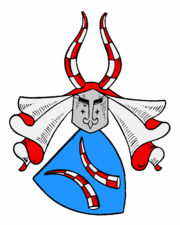Kaspar von Nostitz (captain)
Kaspar I. von Nostitz-Tzschocha (* before 1430, † around 1490) was a mercenary leader of the Teutonic Order in the Thirteen Years' War , later a captain of Görlitz and Bautzen and a Silesian field captain .
ancestry
Kaspar von Nostiz came from the Lusatian nobility of the von Nostitz family with possessions in both Upper Lusatia and Silesia. At that time both countries belonged to the Kingdom of Bohemia .
Life
In the service of Sagan
Since 1439 he was involved in the Glogau succession dispute. In the same year, the Nostitz family gave up their headquarters at Kittlitz Castle, including the manor Nostitz that gave it its name . For this purpose, the Czocha Castle , which had previously been devastated by the Hussites and which Kaspar adopted in his name, was taken over.
In the service of the Teutonic Order
Kaspar von Notitz was a squire and later a knight in his younger years . In 1454 he set out for Prussia with Duke Rudolf von Sagan in order to hasten to help the Teutonic Order against Poland with a mercenary army that had been recruited in Silesia and Lusatia . Kaspar von Nostitz is referred to in the chronicles as one of the captains of this army. In this capacity he took part in the Battle of Konitz (1454), which, despite the death of its leader, Rudolf von Sagan, ended with a victory for the forces of the order. Later he took over the command of the garrison of Konitz . Together with his fellow Silesian, Fritz von Rabeneck , he controlled Pomerellen and successfully fought the Danzigers until their forces were crushed in the Battle of Schwetzin . He could escape himself. As the commander of Konitz, he maintained this important place for the German Order until the end of the Thirteen Years' War . During this time he was wounded several times. In 1466, after a three-month siege, he surrendered the city to the Poles , after an armistice had previously been announced in Thorn , which later led to the Peace of Thorn . This long war was not worth it for the professional mercenary, as the religious state became insolvent and Nostiz did not receive the promised wages, although he had invested his own fortune; Among other things, he brought four guns from Silesia , with which he was allowed to withdraw.
Before that, during a break in the Prussian War in 1464, he had temporarily entered the service of Wroclaw against the utraquist King George of Podebrady . In 1467 he became captain of Görlitz and a partisan of the opposing king Matthias Corvinus in Upper Lusatia . In the following decade he took part in the war between Podebrady and Corvinus, which lasted until 1479. For the Catholic there was no alternative to the Grünberger Alliance . In the state parliaments he was considered a good speaker.
Local patriot
Although he was a loyal supporter of Corvin by then, he criticized him for his centralization and connection plans. Therefore, in 1471, he protested, in vain, against the appointment of Duke Friedrich I of Liegnitz as governor of Upper Lusatia . However, in 1488 he succeeded in thwarting the prescription of the country to the Crown of Hungary operated by the royal lawyer Georg von Stein .
End of life
He probably died in 1490.
Family and offspring
Kaspar (lat. Caspar ) I. is considered to be the protoplast of the Rothenburg line of those of Nostitz . Together with Sabine von Gersdorf he had three sons:
- Hartwig, Herr auf Rottenburg, ∞ NN from Metzrad
- Georg († 1510) Lord of Tschochau , ∞ Ursula von Klüx and Hennersdorf
- Otto, Lord of God
literature
- Marian Biskup , Druga faza wojny trzynastoletniej (1462-1466). [Second phase of the Thirteen Years War 1462-1466] , in: Gerard Labuda (ed.), Historia Pomorza. [History of Pomerania] , Wydawnictwo Poznańskie, Poznań 1972
- Marian Biskup , Trzynastoletnia wojna z Zakonem Krzyżackim 1454-1466 , Wydawnictwo MON, Kołobrzeg 1967
- Detmar and FH Grautoff (eds.), The Luebeck Chronicles in Low German , Hamburg 1830
- Jan Długosz, Jana Długosza Kanonika Krakowskiego Dziejów Polski ksiąg 12 , part 5, book 12, pp. 331–334
- Johann Samuelersch and Johann Gottfried Gruber : General Encyclopedia of Sciences and Arts , Leipzig 1836
- Historical Commission for Silesia (Ed.): History of Silesia. Volume 1, Sigmaringen 1988, ISBN 3-7995-6341-5 , p. 207
- Theodor Hirsch , Max Toeppen, Ernst Strehlke: Scriptores rerum Prussicarum . The historical sources of the Prussian prehistoric times up to the fall of the order. Volume 3–5, Leipzig 1861–1874.
- Hernann Knothe, History of the Upper Lusatian Nobility and their Estates , Leipzig 1879
- Gert von Pistohlkors : German history in Eastern Europe: Baltic countries , Siedler Verlag, Berlin 2002, ISBN 3-88680-774-6
- Johannes Voigt , History of Prussia: From the oldest times to the fall of the rule of the Teutonic Order. Koenigsberg 1838.
- Hermann Markgraf : Nostitz-Tzschocha, Kaspar von . In: Allgemeine Deutsche Biographie (ADB). Volume 24, Duncker & Humblot, Leipzig 1887, p. 34 f.
- Constantin von Wurzbach : Nostitz on Tschochau, Kaspar von . In: Biographisches Lexikon des Kaiserthums Oesterreich . 20th part. Kaiserlich-Königliche Hof- und Staatsdruckerei, Vienna 1869, p. 396 ( digitized version ).
Web links
- Kaspar v. Nostitz in German biography
- Kaspar v. Nostitz and his descendants
- Dr. Karnatz: Noble family von Nostitz sighted on September 23, 2015
| personal data | |
|---|---|
| SURNAME | Nostitz, Kaspar von |
| ALTERNATIVE NAMES | Nostitz-Tzschocha, Kaspar I. von; Tzschocha, Kaspar von |
| BRIEF DESCRIPTION | Mercenary leader of the Teutonic Order |
| DATE OF BIRTH | before 1430 |
| DATE OF DEATH | uncertain: 1490 |

